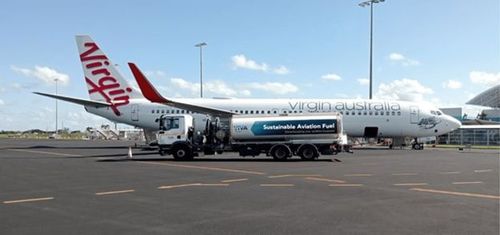Virgin Australia and Viva Energy join forces in SAF initiative

SOURCE: Virgin Australia
March 21, 2025
BY Virgin Australia
Virgin Australia has entered an agreement with Viva Energy to source sustainable aviation fuel (SAF) for its flights departing from Proserpine, Queensland, between March and July 2025.
SAF, produced from renewable resources such as waste oils, agricultural residues, and non-food crops, is considered a critical game-changer in the aviation industry’s efforts to reach net zero emissions by 2050. This reflects SAF’s significantly lower lifecycle greenhouse gas emissions profile compared to that of conventional jet fuel.
Under the terms of the agreement, Viva Energy will provide Virgin Australia with SAF consisting of Jet A1 and a 30-40% synthetic blend component made from waste and residue feedstocks. The blend is fully compatible with existing aircraft and fuelling infrastructure, and all regulatory and safety requirements.
Through this collaboration, Viva Energy will continue to expand its ability to supply SAF-blended jet fuel across Australia utilising its infrastructure assets, while exploring regional SAF delivery, storage and handling, and direct into-wing dispensing.
Commentary from Virgin Australia
Virgin Australia Chief Corporate Affairs and Sustainability Officer, Christian Bennett, said the collaboration with Viva Energy is another step forward in Virgin Australia’s sustainability journey, which recognises the long-term importance of alternative fuels to reduce carbon emissions.
Advertisement
Advertisement
“SAF represents the critical long-term opportunity in commercial aviation’s pursuit of its 2050 net zero emissions ambition,” he said.
“Partnership, focused policy development, and collaborations such as this with Viva Energy will be essential if we are to adopt successfully SAF’s broader use in Australia over the years and decades ahead.
“Ensuring SAF is affordable and accessible will be key to achieving lowest cost carbon abatement at the same time as maintaining the essential role of aviation in connecting Australian communities.”
Commentary from Viva Energy
Viva Energy’s General Manager for Aviation, Nick Adams, said the initiative is an important step in the establishment of an ongoing supply of SAF for air travel in regional Australia.
Advertisement
Advertisement
“It is clear that SAF is going to play a bigger role for commercial airlines in this country as they move towards a more sustainable future,” he said.
“Through this collaboration – and drawing on the strengths of Viva Energy’s national distribution network and experience supplying high-quality fuels and aviation operations – we will be working with Virgin Australia to establish the supply chains that will be critical to the future of the aviation industry. Viva Energy is also delighted to be helping a key partner like Virgin Australia in its sustainability journey.”
Commentary from Whitsunday Regional Council
Whitsunday Regional Council Mayor, Ry Collins, has welcomed the introduction of SAF at Whitsunday Coast Airport, calling it a ‘perfect fit’ given the region’s deep connection to the Great Barrier Reef and its commitment to sustainable tourism.
“It makes absolute sense that Virgin Australia would choose Whitsunday Coast Airport as the launch site for its first ongoing SAF-powered services,” Mayor Collins said.
“We are committed to driving initiatives locally that produce world-class bio-products, so I applaud Virgin Australia and Viva Energy for their commitment to SAF and for recognising the Whitsundays as an ideal location to showcase the benefits of sustainable aviation.
“We are located in one of the most pristine and ecologically significant regions in the world, and as the gateway to the Great Barrier Reef, we have a responsibility to embrace innovative solutions that reduce our environmental footprint.”
Related Stories
The U.S. Energy Information Administration maintained its forecast for 2025 and 2026 biodiesel, renewable diesel and sustainable aviation fuel (SAF) production in its latest Short-Term Energy Outlook, released July 8.
XCF Global Inc. on July 10 shared its strategic plan to invest close to $1 billion in developing a network of SAF production facilities, expanding its U.S. footprint, and advancing its international growth strategy.
U.S. fuel ethanol capacity fell slightly in April, while biodiesel and renewable diesel capacity held steady, according to data released by the U.S. EIA on June 30. Feedstock consumption was down when compared to the previous month.
XCF Global Inc. on July 8 provided a production update on its flagship New Rise Reno facility, underscoring that the plant has successfully produced SAF, renewable diesel, and renewable naphtha during its initial ramp-up.
The USDA’s Risk Management Agency is implementing multiple changes to the Camelina pilot insurance program for the 2026 and succeeding crop years. The changes will expand coverage options and provide greater flexibility for producers.
Upcoming Events










